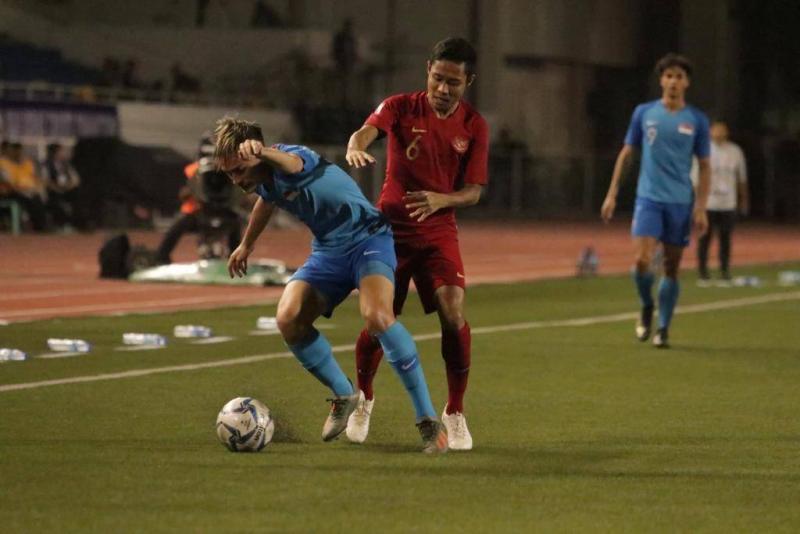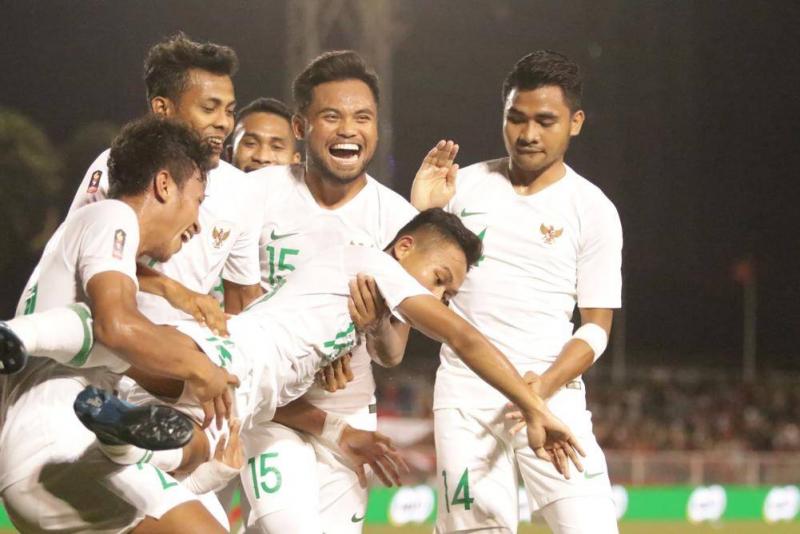Indonesia ended their 2019 SEA Games campaign with a silver medal, having been handed a heavy 3-0 defeat by Vietnam in the final match of the tournament. Despite the humiliation in the final, it has been a good tournament overall for Indonesia, who improved their bronze medal achievement in the 2017 SEA Games but still longing for that first gold medal since 1991. Football Tribe Asia’s Krishna Sadhana takes a look at the five things that Indonesia learned throughout their journey in the Games…

Osvaldo Haay the Main Man
Much has been said about the presence of Egy Maulana Vikri in this year's SEA Games. Molded by Polish Ekstraklasa club Lechia Gdansk, it is expected that Egy would perform at a higher standard than his teammates. While Egy indeed impressed at the SEA Games, contributing to Indonesia's run to the tournament final with 4 goals to his name, he wasn't the main man for Garuda Muda during the duration of the Games. Instead that title went to Persebaya Surabaya's very own Osvaldo Haay, who, alongside Ha Duc Chinh of Vietnam, became the top-scorer of the 2019 SEA Games men's football tournament with 8 goals. The Jayapura-born player was often placed as either a centre forward or a central attacking mid by Indonesia head coach Indra Sjafri and he looked sharp from both positions. Osvaldo benefited massively from Sjafri's tactics, often receiving a steady supply of balls from either Saddil Ramdani or Egy from the wings, before using his pacy speed and electrifying technique to reduce defenses into shreds. Should Osvaldo keeps up his performance or elevate it to the next level in future tournaments, it is not impossible that he will emulate the footsteps of one of Indonesia's deadliest attackers who also hailed from the land of Papua, Boaz Solossa, or even surpass the Persipura Jayapura legend.

Indonesia Desperately Needs a Plan B
Indonesia's midfield engine boasts two overage players that has been impressive throughout the tournament, 24-year old Evan Dimas of Barito Putera and 24-year old Zulfiandi of Madura United. However at times Indonesia has shown that they are depending too much in these two to run the midfield dynamo, a fact that was brutally shown in the final against Vietnam. With Evan off injured, Indonesia's midfield, already stricken by Vietnam's physical brand of play, was rendered virtually useless. An over-reliance on one or two key players isn't a very good thing in teams that strive for success in championships, as they must devise several backup plans should these key players are unavailable. Vietnam managed to offset the loss of their injured talisman Nguyen Quang Hai en route to the gold medal, with Park Hang-seo's boys looking as dangerous as ever without the Hanoi FC star. A number of players in Sjafri's squad must step up their game to Evan and Zulfiandi's level should Indonesia wish to maintain their game without the duo, while Sjafri himself must think of alternative plans should his key players are out injured or suspended in order for Indonesia to maintain their consistency at any tournament.

Attacking Flair Keeps the Indonesian Fans Entertained
Sjafri set up his SEA Games team in an attacking formation, with four attacking players - two wingers, a central attacking mid, and a centre forward. Garuda Muda looked deadly both when they're on the offensive or when they're on the counter, and their attractive style of play has kept their fans on their toes and entertained. The Indonesian players refused to park the bus and play it safe, resulting in an attractive offensive display that earned them 21 goals throughout the tournament. The wings of Garuda Muda often showed breathtaking amount of pace that help set-up the Indonesian attacking scheme, as displayed by Saddil, Egy, and Asnawi Mangkualam throughout the tournament.

Indonesian Defense Often Bottles It During Important Moments
Indonesia's defense was the strongest in the 2019 SEA Games group stages, conceding only 2 goals in 5 group stage games. Andy Setyo and his colleagues at the back only allowed those two goals in the sole blemish within Indonesia's group stage campaign - a 2-1 defeat at the hands of Vietnam. However, once the tournament shifted into the knockout stages, the Indonesian defense crumbled and buckled rather easily. Myanmar managed to score two against Indonesia thanks to a number of errors committed not only by the Indonesian backline but also by goalkeeper Nadeo Argawinata in the semifinal, while Vietnam managed to blast three goals past Nadeo in the final. Knockout games brings a different mental atmosphere compared to group stage games, meaning that players must remained 100% focused at the task in hand once a tournament shifts to its business end. The Indonesian defense consists of players who are yet to hit their peak performances and are still developing, meaning that there's still time for the Indonesian defensive players to improve on their mental fortitude in order to perform well during knockout games and not crumble underneath pressure.

Tae-yong or Milla May Come, But Indra Sjafri Must Stay
It is safe to say that 2019 has been a mixed bag for Garuda Muda head coach Indra Sjafri. He brought Indonesia to the heights of the 2019 AFF U-22 Youth Championship in Cambodia, winning the title with his Garuda Muda squad, however 2019 also saw Sjafri failing to qualify Indonesia to the 2020 AFC U-23 Championship as well as the silver medal in the 2019 SEA Games. During the buildup of the Games and as a response to Indonesia's ailing campaign in the 2022 World Cup qualifiers, the Football Federation of Indonesia (PSSI) decided to replace outgoing senior national team head coach Simon McMenemy with a brand new head coach. There were two candidates chosen by the PSSI for the job - former South Korea national team boss Shin Tae-yong and a familiar face, former Indonesia national team head coach Luis Milla. Either Tae-yong or Milla will take charge of not only the senior national team, but also the U-22/U-23 national team, currently being managed by Sjafri. Sjafri's contract runs out after the conclusion of the 2019 SEA Games and with Tae-yong looking likely to make the switch to the Chinese League One after receiving an offer from recently relegated Shenzhen FC, it is very possible that Milla will replace Sjafri in the U-22/U-23 dugout.
However getting rid of Sjafri from the national team setup will not be a wise move from PSSI - after all, barring a one-year spell in 2015-16 at Bali United, Sjafri had managed the Indonesia national team in various age group levels since 2011, meaning that he knew the teams like the back of his hand. During Milla's previous tenure with the Indonesian national teams, he had won Garuda Muda the bronze medal during the 2017 SEA Games, an achievement that was bettered by Sjafri this year. Should Milla makes his return to the Indonesian national team dugout, it will be for the best if he keeps Sjafri around, either as an assistant manager or as an advisor to him. Indonesian football saw brief glimpses of revival after the FIFA suspension of 2015-16 underneath the two men, and exciting things will await Indonesia should these men are allowed to work together as a single cohesive unit.


